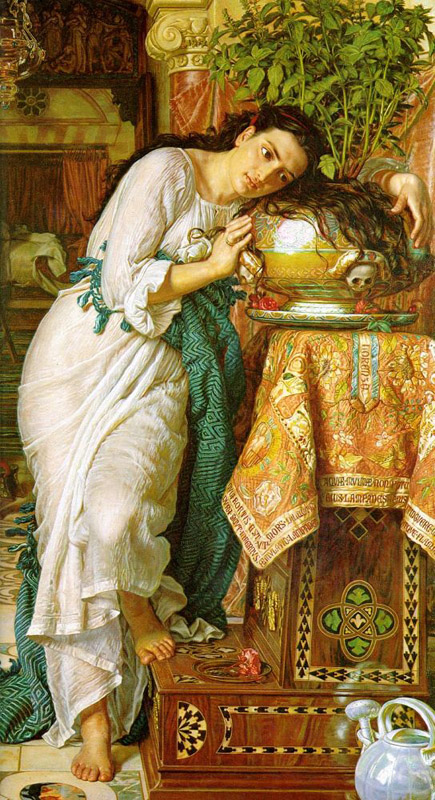William Holman Hunt’s painting Isabella and the Pot of Basil captivates. It’s a painting that is difficult to walk away from when you see it in person; it’s quite large and Isabella looks so very real that she draws you in as you recognize both her exquisite beauty and her melancholy.
Today I was thinking about the painting and the story it is based on (first told in the Decameron by Boccaccio, which later inspired the poem by Keats). Isabella, the daughter of an affluent family, is in love with one of their servants, Lorenzo. Her brothers, having planned for Isabella to make a financially advantageous marriage, decide that swift action must be taken to stop the lovers. They murder Lorenzo. His ghost later appears to Isabella and he leads her to his buried body. She digs him up, removes his head, and buries it in a pot of basil. She then cares for the basil obsessively, pining away and consumed with grief. It’s a romantic yet macabre story. Reading the poem and seeing the many depictions of it, it’s easy to be swept away in the melodrama.
This morning, though, it occurred to me that there is a deeper lesson to be gleaned here.
Nothing ends, everything changes.
Horrible things happen and we experience grief and despair and all sorts of wretched states of being that we are convinced we will be stuck in forever.
But, like the basil nourished by the decapitated head of Lorenzo, something grows.
No one likes manure, but it causes things to bloom.
I despise cliches. I cringe when people speak in platitudes and tell grief stricken friends that everything happens for a reason or that their loss was part of God’s plan. Loss, depression, and sorrow are difficult to process and shallow statements never help. They are glancing blows, often said in kindness but with the potential to compound the pain.
Paintings like Isabella and the Pot of Basil help me to think about loss and its many aspects in ways that are far more useful and probing. Art and literature help me plumb the depths so I can find healing and hope when I need it.
Isabella does not gloss over horror by pretending the loss makes sense in some sort of cosmic plan. Yet it tells me that despite the pain, there is growth. It may not be the growth we wanted, but it’s what we have and how we respond to it is in our control.
The most obvious example of growth is the basil. There is a tragic cycle here. It flourishes from Lorenzo’s decay. Isabella’s tears moisten the leaves. While the basil grows, Isabella’s living body does the opposite. She wastes away as she obsessively tends the plant. Just like Isabella, we pay the price for anything that commands our attention with obsession. We need a healthy balance in our lives or the cost becomes dangerously high.
We all pay the price of admission.
Another example of growth I see here is the work itself. Holman Hunt used his pregnant wife Fanny as a model. His child grew in the womb while this painting was being born on canvas. Hunt’s wife died in childbirth. The work then grew in a different direction as he finished it as a memorial to her. He continued to paint the grief stricken Isabella, the real artist and the fictional maiden each somehow intertwining and becoming examples of living with loss.
The fact that I love this painting could be seen as morbid, perhaps. It’s a dark tale and there is no happy ending. I don’t need happy endings to convince me they exist. And I don’t need a cheerful image that focuses only on the positive.
What I need is art that explores all the ugliness so that I can process it when it happens, and process it in a way that allows me to see the beauty within my own life. Because it’s there and I’m grateful for it and images like Isabella help me to hang on to the happiness and peace I enjoy with all my might. I said I did not like cliches, but I am going to use one now: Life is short. And I am going to experience it with everything I have.


Very nice blog, it makes you think about a lot.
There’s absolutely nothing wrong with liking morbid or dark tales. Don’t ever let yourself feel like you’re being weird or macabre because you are able to see meaning in stories of suffering and human cruelty. Many women who came from wealthy families were nothing but pawns for their male relatives, and this story is an excellent way of viewing the differences in our reality then and now, especially in matters of love.
I just wanted to tell you this as I experienced a very deep bout of depression a year ago and spent hours absorbing myself in ‘dark’ topics. Now, I don’t even see the darkness when people complain about stories being ‘chilling’ or ‘grotesque’. Once you have spent a lot of time confronting your own inner darkness and pain, you realize how much human beings run away from those dark sides of ourselves we can’t control but oftentimes come out in different ways.
Anyway, I’ll shut up now. Continue doing beautiful things!
Blessings.
Adore this site, milady. A labor of love, truly.
I found it, wandering in darkness in Dantean reverie. I recently learned a pre-Raphaelite goddess, a gifted athlete, I worshipped unrequitedly some 30 years ago has had ALS for some years.
I learned this only after a very vivid, intimate dream of her. It stirred a lot of passions that haven’t been in my life for some time, so I googled her….
“(To one, it is ten years of years.
. . . Yet now, and in this place,
Surely she leaned o’er me—her hair
Fell all about my face. . . .
Nothing: the autumn fall of leaves.
The whole year sets apace.)”
In trutina mentis dubia fluctuant contraria: should I try to contact her? To offer comfort? friendship? share memories? or merely diversion as she wastes away, prisoner in her own splendid body?
But whose end serves that chivalric gesture, really, hers or mine? By all accounts ‘Atalante’ was and is a fine person. But the deity I worshipped then lived only between my ears. And the decade I spent after striving to become a man worthy of a woman I never thought to see again (we live on different continents), what would that really mean to her? So isn’t it just an egotistical, self-justifying act on my part? And what about her family, or mine?
“Then who shall close my Lady’s eyes
And who shall fold her hands?
Will any hearken if she cries
Up to the unknown lands?”
… In any case, a Dante or Cyrano today would be accused of creepy stalker behaviour and promptly remanded to therapy. I have no recognizable social right to a role in her life. So it seems life alas, cannot imitate art, nor achieve closure or symmetry through grand gestures. No, we must measure out our loves with coffee spoons.
So, like Dante, all l can really do in all modesty and prudence is to go on about my life as she spends out hers, running her last race. And write, discreetly bleeding out a little of my hurt here, in a quiet corner of the internet.
Thanks for listening.
“I don’t need happy endings to convince me they exist.” So much truth carried in that simple sentence.
<3 Thank you, Valerie.